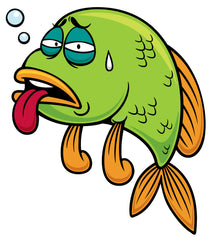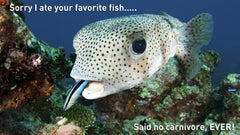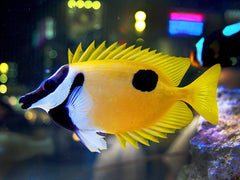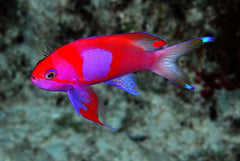How to Select the Best Fish for Saltwater Aquariums
Setting up a saltwater aquarium can be a lot of fun. Unpacking the tank, stand and brand new equipment, then spending time connecting everything and aquascaping until it is just right. The hardest part is the waiting process while the aquarium cycles, and by the time it's ready most salt water aquarists are chomping at the bit to get some gorgeous fish in the tank! But this raises the question, "How do you select the right saltwater fish for your aquarium?" Today we'll explore how to select the best fish for your salt water aquarium.
Health:
 When buying quality marine fish for your reef or fish only salt water tank, the health of the fish is your top responsibility. Make sure that your water parameters and water quality are in the optimal range to provide a healthy environment for the fish to live in. It is first and foremost the responsibility of the aquarist to practice good fish keeping.
When buying quality marine fish for your reef or fish only salt water tank, the health of the fish is your top responsibility. Make sure that your water parameters and water quality are in the optimal range to provide a healthy environment for the fish to live in. It is first and foremost the responsibility of the aquarist to practice good fish keeping.
 Next, you want to make sure you are buying a healthy fish. While most successful salt water aquarium stores are owned by (and staffed with) conscientious aquarists, sometimes it is difficult to tell if a fish is sick at the time it is purchased. Monitor the fish for a while and look for tell tale signs of illness such as cloudy eyes, frayed or tattered fins, lacerations or red streaks on the body, a salt-looking sprinkle on the fish's body or eyes which is indicative of parasites, and white cottony tufts on the fins. Also, watch the fish and make sure it isn't overly aggressive, non-responsive or constantly hiding. While not sure signs of sickness, these behaviors can indicate a fish that is under the weather.
Next, you want to make sure you are buying a healthy fish. While most successful salt water aquarium stores are owned by (and staffed with) conscientious aquarists, sometimes it is difficult to tell if a fish is sick at the time it is purchased. Monitor the fish for a while and look for tell tale signs of illness such as cloudy eyes, frayed or tattered fins, lacerations or red streaks on the body, a salt-looking sprinkle on the fish's body or eyes which is indicative of parasites, and white cottony tufts on the fins. Also, watch the fish and make sure it isn't overly aggressive, non-responsive or constantly hiding. While not sure signs of sickness, these behaviors can indicate a fish that is under the weather.
 When you have selected a fish that you would like to buy, ask the store clerk or owner to feed the fish so you can see that it is eating. A well acclimated and healthy fish will readily eat and is inclined to do so as well in your aquarium. Lastly, ask the store is they have a "Stay Alive Policy", meaning that they will guarantee that the fish will stay alive for a certain amount of time, usually 1 - 2 weeks. Beyond that, if the fish dies, it is probably not because it was sick when you purchased it, but rather that your tank has adverse water conditions that contributed to the sickness or death of a fish.
When you have selected a fish that you would like to buy, ask the store clerk or owner to feed the fish so you can see that it is eating. A well acclimated and healthy fish will readily eat and is inclined to do so as well in your aquarium. Lastly, ask the store is they have a "Stay Alive Policy", meaning that they will guarantee that the fish will stay alive for a certain amount of time, usually 1 - 2 weeks. Beyond that, if the fish dies, it is probably not because it was sick when you purchased it, but rather that your tank has adverse water conditions that contributed to the sickness or death of a fish.
Compatibility:
 You'll want to make sure that the fish you are considering to purchase are compatible with each other. You do not want to select a fish that will start attacking your other fish, or that will be attacked when added to your tank. Aggressive, carnivorous fish such as eels, groupers, solider fish, puffers, lion fish, larger angelfish, butterfly fish, larger wrasses, trigger fish and parrot fish should not be added to a reef aquarium because they will make a quick meal out of the smaller fish, corals and invertebrates in your reef system. If you want to keep aggressive fish, they should be kept in a large tank with similar sized carnivorous fish.
You'll want to make sure that the fish you are considering to purchase are compatible with each other. You do not want to select a fish that will start attacking your other fish, or that will be attacked when added to your tank. Aggressive, carnivorous fish such as eels, groupers, solider fish, puffers, lion fish, larger angelfish, butterfly fish, larger wrasses, trigger fish and parrot fish should not be added to a reef aquarium because they will make a quick meal out of the smaller fish, corals and invertebrates in your reef system. If you want to keep aggressive fish, they should be kept in a large tank with similar sized carnivorous fish.
 Tangs and rabbit fish generally work well in both reef and fish only aquariums and the bonus is that they will eat undesirable algae in your tank. Most rabbit fish have venomous spines, so be sure to exercise caution around them when cleaning the tank.
Tangs and rabbit fish generally work well in both reef and fish only aquariums and the bonus is that they will eat undesirable algae in your tank. Most rabbit fish have venomous spines, so be sure to exercise caution around them when cleaning the tank.
 Basslets, chromis, clown fish, anthias, and gobies are all generally considered to be safe for reef aquariums. They are also suitable for fish only saltwater aquariums, but considering that they tend to be smaller, the larger more aggressive fish may pick on them or turn them into a quick snack between feedings.
Basslets, chromis, clown fish, anthias, and gobies are all generally considered to be safe for reef aquariums. They are also suitable for fish only saltwater aquariums, but considering that they tend to be smaller, the larger more aggressive fish may pick on them or turn them into a quick snack between feedings.
